Deck 9: Systems of Equations and Inequalities
Question
Question
Question
Question
Question
Question
Question
Question
Question
Question
Question
Question
Question
Question
Question
Question
Question
Question
Question
Question
Question
Question
Question
Question
Question
Question
Question
Question
Question
Question
Question
Question
Question
Question
Question
Question
Question
Question
Question
Question
Question
Question
Question
Question
Question
Question
Question
Question
Question
Question
Question
Question
Question

Unlock Deck
Sign up to unlock the cards in this deck!
Unlock Deck
Unlock Deck
1/53
Play
Full screen (f)
Deck 9: Systems of Equations and Inequalities
1
Solve using any method. 
A)
B)
C)
D) inconsistent
E)

A)

B)

C)

D) inconsistent
E)


2
Solve the system by the method of substitution. 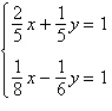
A) (3, 4)
B) (-3, 4)
C) (4, 3)
D) (-4, 3)
E) (4, -3)

A) (3, 4)
B) (-3, 4)
C) (4, 3)
D) (-4, 3)
E) (4, -3)
(4, -3)
3
Solve the system by the method of elimination. 
A) inconsistent
B)
C)
D)
E)

A) inconsistent
B)

C)

D)

E)


4
Solve the system by the method of elimination. 
A)
B) (dependent)
(dependent)
C)
D) inconsistent
E)

A)

B)
 (dependent)
(dependent)C)

D) inconsistent
E)


Unlock Deck
Unlock for access to all 53 flashcards in this deck.
Unlock Deck
k this deck
5
Find the least squares regression line  for the points
for the points  by solving the system for a and b.
by solving the system for a and b. 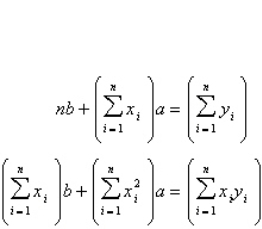 Points:
Points:  space
space
A) y = 3.93x -4.21
B) y = 2.80x -3.20
C) y = -2.66x +2.80
D) y = -3.47x -4.21
E) y = -3.20x +2.80
 for the points
for the points  by solving the system for a and b.
by solving the system for a and b.  Points:
Points:  space
spaceA) y = 3.93x -4.21
B) y = 2.80x -3.20
C) y = -2.66x +2.80
D) y = -3.47x -4.21
E) y = -3.20x +2.80

Unlock Deck
Unlock for access to all 53 flashcards in this deck.
Unlock Deck
k this deck
6
During one performance of a local arts council's presentation of Fiddler on the Roof, the box office sold 200 tickets and collected $1372. If adult tickets sold for $8 and children's tickets sold for $6, how many of each type of ticket were sold?
A) adult tickets sold = 86; children's tickets sold = 114
B) adult tickets sold = 97; children's tickets sold = 125
C) adult tickets sold = 114; children's tickets sold = 86
D) adult tickets sold = 97; children's tickets sold = 99
E) adult tickets sold = 125; children's tickets sold = 97
A) adult tickets sold = 86; children's tickets sold = 114
B) adult tickets sold = 97; children's tickets sold = 125
C) adult tickets sold = 114; children's tickets sold = 86
D) adult tickets sold = 97; children's tickets sold = 99
E) adult tickets sold = 125; children's tickets sold = 97

Unlock Deck
Unlock for access to all 53 flashcards in this deck.
Unlock Deck
k this deck
7
Solve using any method. 
A)
B)
C) inconsistent
D)
E)

A)

B)

C) inconsistent
D)

E)


Unlock Deck
Unlock for access to all 53 flashcards in this deck.
Unlock Deck
k this deck
8
An airplane flying into a headwind travels 216 miles in 2 hours and 42 minutes. On the return flight, the distance is traveled in 2 hours. Find the airspeed of the plane and the speed of the wind, assuming that both remain constant.
A) plane speed = 71 mph; wind speed = 83 mph
B) plane speed = 109 mph; wind speed = 14 mph
C) plane speed = 94 mph; wind speed = 14 mph
D) plane speed = 71 mph; wind speed = 14 mph
E) plane speed = 109 mph; wind speed = 101 mph
A) plane speed = 71 mph; wind speed = 83 mph
B) plane speed = 109 mph; wind speed = 14 mph
C) plane speed = 94 mph; wind speed = 14 mph
D) plane speed = 71 mph; wind speed = 14 mph
E) plane speed = 109 mph; wind speed = 101 mph

Unlock Deck
Unlock for access to all 53 flashcards in this deck.
Unlock Deck
k this deck
9
Use a graphing utility to solve the system of equations. Find the solution accurate to two decimal places. 
A)
B)
C)
D) no real solution
E)

A)

B)

C)

D) no real solution
E)


Unlock Deck
Unlock for access to all 53 flashcards in this deck.
Unlock Deck
k this deck
10
Determine which ordered pair is a solution of the system. 
A) (1, -2)
B) (-5, 4)
C) (2, 1)
D) (-2, 1)
E) (-4, -5)

A) (1, -2)
B) (-5, 4)
C) (2, 1)
D) (-2, 1)
E) (-4, -5)

Unlock Deck
Unlock for access to all 53 flashcards in this deck.
Unlock Deck
k this deck
11
Find the dimensions of the rectangle meeting the specified conditions. The perimeter is 68 centimeters and the length is 2 centimeters more than the width.
A)
B)
C)
D)
E)
A)

B)

C)

D)

E)


Unlock Deck
Unlock for access to all 53 flashcards in this deck.
Unlock Deck
k this deck
12
Solve the system by the method of substitution. 
A) no real solution
B) (-4, -25), (5, -16)
C) (-4, -23), (5, -14)
D) (-4, 15), (5, 24)
E) (-4, -25)

A) no real solution
B) (-4, -25), (5, -16)
C) (-4, -23), (5, -14)
D) (-4, 15), (5, 24)
E) (-4, -25)

Unlock Deck
Unlock for access to all 53 flashcards in this deck.
Unlock Deck
k this deck
13
Find the sales necessary to break even (R - C = 0) for the cost C of producing x units and the revenue R obtained by selling x units. (Round to the nearest whole unit.) 
A) 782 units or 852 units
B) 852 units
C) no real solution
D) 782 units
E) 831 units

A) 782 units or 852 units
B) 852 units
C) no real solution
D) 782 units
E) 831 units

Unlock Deck
Unlock for access to all 53 flashcards in this deck.
Unlock Deck
k this deck
14
Solve the system by the method of elimination. 
A) inconsistent
B)
C)
D)
E)

A) inconsistent
B)

C)

D)

E)


Unlock Deck
Unlock for access to all 53 flashcards in this deck.
Unlock Deck
k this deck
15
Find the equilibrium point of the demand and supply equations. (The equilibrium point is the price p and number of units x that satisfy both the demand and supply equations.) 
A)
B)
C) inconsistent
D)
E)

A)

B)

C) inconsistent
D)

E)


Unlock Deck
Unlock for access to all 53 flashcards in this deck.
Unlock Deck
k this deck
16
Determine which ordered pair is a solution of the system. 
A) (-7,-3)
B) (-4, -6)
C) (-7, 1)
D) (6, 4)
E) (6, -4)

A) (-7,-3)
B) (-4, -6)
C) (-7, 1)
D) (6, 4)
E) (6, -4)

Unlock Deck
Unlock for access to all 53 flashcards in this deck.
Unlock Deck
k this deck
17
The sales of various types of lawn and garden tools vary according to the season. At a certain home improvement store, the monthly sales H of garden hoes (hoes sold per month) declines from July to October whereas the monthly sales of lawn rakes R (rakes sold per month) increase during this same interval. The sales of these two items during the calendar months July-October are modeled by the equations:  where t is the month (t = 7 corresponds to July). In which month does the number of rakes sold equal the number of hoes sold?
where t is the month (t = 7 corresponds to July). In which month does the number of rakes sold equal the number of hoes sold?
A) September
B) October
C) July
D) August
E) November
 where t is the month (t = 7 corresponds to July). In which month does the number of rakes sold equal the number of hoes sold?
where t is the month (t = 7 corresponds to July). In which month does the number of rakes sold equal the number of hoes sold?A) September
B) October
C) July
D) August
E) November

Unlock Deck
Unlock for access to all 53 flashcards in this deck.
Unlock Deck
k this deck
18
Solve the system by the method of substitution. 
A) (7, -5), (-7, 5)
B) (7, -5)
C) (0, 7)
D) (0, 0)
E) no real solution

A) (7, -5), (-7, 5)
B) (7, -5)
C) (0, 7)
D) (0, 0)
E) no real solution

Unlock Deck
Unlock for access to all 53 flashcards in this deck.
Unlock Deck
k this deck
19
Solve the system by the method of elimination. 
A)
B)
C)
D) inconsistent
E)

A)

B)

C)

D) inconsistent
E)


Unlock Deck
Unlock for access to all 53 flashcards in this deck.
Unlock Deck
k this deck
20
Solve the system by the method of substitution. 
A) (5, 102), (3, 56), (1, 18)
B) no real solution
C) (-3, -34), (1, 18)
D) (5, 102), (-3, -34), (0, 2)
E) (5, 102), (-1, -12)

A) (5, 102), (3, 56), (1, 18)
B) no real solution
C) (-3, -34), (1, 18)
D) (5, 102), (-3, -34), (0, 2)
E) (5, 102), (-1, -12)

Unlock Deck
Unlock for access to all 53 flashcards in this deck.
Unlock Deck
k this deck
21
Solve the system of linear equations. 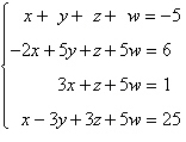
A)
B)
C)
D)
E) inconsistent

A)

B)

C)

D)

E) inconsistent

Unlock Deck
Unlock for access to all 53 flashcards in this deck.
Unlock Deck
k this deck
22
A residential building contractor borrowed $30,000 to complete a new home. Some of the money was borrowed at 5%, some at 6%, and some at 8%. How much was borrowed at each rate if the annual interest owed was $1780 and the amount borrowed at 6% is four times more than the amount borrowed at 8%?
A) $8000 at 5%; $18,000 at 6%; $4000 at 8%
B) $10,000 at 5%; $16,000 at 6%; $4000 at 8%
C) $9000 at 5%; $14,000 at 6%; $6000 at 8%
D) $8000 at 5%; $17,000 at 6%; $5000 at 8%
E) $7000 at 5%; $20,000 at 6%; $5000 at 8%
A) $8000 at 5%; $18,000 at 6%; $4000 at 8%
B) $10,000 at 5%; $16,000 at 6%; $4000 at 8%
C) $9000 at 5%; $14,000 at 6%; $6000 at 8%
D) $8000 at 5%; $17,000 at 6%; $5000 at 8%
E) $7000 at 5%; $20,000 at 6%; $5000 at 8%

Unlock Deck
Unlock for access to all 53 flashcards in this deck.
Unlock Deck
k this deck
23
Solve the system of linear equations. 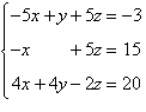
A)
B)
C)
D)
E)

A)

B)

C)

D)

E)


Unlock Deck
Unlock for access to all 53 flashcards in this deck.
Unlock Deck
k this deck
24
Write the form of the partial fraction decomposition of the rational expression. Do not solve for the constants. 
A)
B)
C)
D)
E)

A)

B)

C)

D)

E)


Unlock Deck
Unlock for access to all 53 flashcards in this deck.
Unlock Deck
k this deck
25
Find the equation of the circle  that passes through the points
that passes through the points  .
.
A)
B)
C)
D)
E)
 that passes through the points
that passes through the points  .
.A)

B)

C)

D)

E)


Unlock Deck
Unlock for access to all 53 flashcards in this deck.
Unlock Deck
k this deck
26
Write the partial fraction decomposition of the rational expression. 
A)
B)
C)
D)
E)

A)

B)

C)

D)

E)


Unlock Deck
Unlock for access to all 53 flashcards in this deck.
Unlock Deck
k this deck
27
Use back-substitution to solve the system of linear equations. 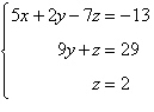
A)
B)
C)
D)
E)

A)

B)

C)

D)

E)


Unlock Deck
Unlock for access to all 53 flashcards in this deck.
Unlock Deck
k this deck
28
Write the partial fraction decomposition of the improper rational expression. 
A)
B)
C)
D)
E)

A)

B)

C)

D)

E)


Unlock Deck
Unlock for access to all 53 flashcards in this deck.
Unlock Deck
k this deck
29
Write the form of the partial fraction decomposition of the rational expression. Do not solve for the constants. 
A)
B)
C)
D)
E)

A)

B)

C)

D)

E)


Unlock Deck
Unlock for access to all 53 flashcards in this deck.
Unlock Deck
k this deck
30
Write the partial fraction decomposition of the rational expression. 
A)
B)
C)
D)
E)

A)

B)

C)

D)

E)


Unlock Deck
Unlock for access to all 53 flashcards in this deck.
Unlock Deck
k this deck
31
Write the partial fraction decomposition of the improper rational expression. 
A)
B)
C)
D)
E)

A)

B)

C)

D)

E)


Unlock Deck
Unlock for access to all 53 flashcards in this deck.
Unlock Deck
k this deck
32
Write the partial fraction decomposition of the rational expression. 
A)
B)
C)
D)
E)

A)

B)

C)

D)

E)


Unlock Deck
Unlock for access to all 53 flashcards in this deck.
Unlock Deck
k this deck
33
Write the form of the partial fraction decomposition of the rational expression. Do not solve for the constants. 
A)
B)
C)
D)
E)

A)

B)

C)

D)

E)


Unlock Deck
Unlock for access to all 53 flashcards in this deck.
Unlock Deck
k this deck
34
Determine which one of the ordered triples below is a solution of the given system of equations. 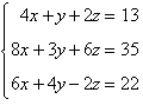
A)
B)
C)
D)
E)

A)

B)

C)

D)

E)


Unlock Deck
Unlock for access to all 53 flashcards in this deck.
Unlock Deck
k this deck
35
Write the partial fraction decomposition of the rational expression. 
A)
B)
C)
D)
E)

A)

B)

C)

D)

E)


Unlock Deck
Unlock for access to all 53 flashcards in this deck.
Unlock Deck
k this deck
36
An object moving vertically is at the given heights at the specified times. Find the position equation  for the object. At t = 1 second, s = 161 feet
for the object. At t = 1 second, s = 161 feet
At t = 2 seconds, s = 98 feet
At t = 3 seconds, s = 3 feet
A)
B)
C)
D)
E)
 for the object. At t = 1 second, s = 161 feet
for the object. At t = 1 second, s = 161 feetAt t = 2 seconds, s = 98 feet
At t = 3 seconds, s = 3 feet
A)

B)

C)

D)

E)


Unlock Deck
Unlock for access to all 53 flashcards in this deck.
Unlock Deck
k this deck
37
Applying Kirchhoff's Laws to the electrical network in the figure, the currents I1, I2, and I3 are the solution of the system 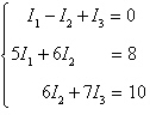 Find the currents.
Find the currents. 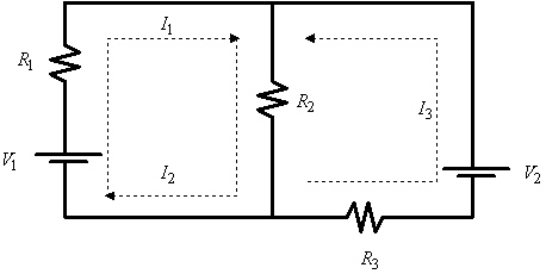

A)


B)


C)


D)


E)


 Find the currents.
Find the currents. 

A)



B)



C)



D)



E)




Unlock Deck
Unlock for access to all 53 flashcards in this deck.
Unlock Deck
k this deck
38
Solve the system of linear equations. 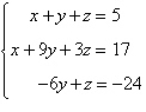
A)
B)
C)
D)
E)

A)

B)

C)

D)

E)


Unlock Deck
Unlock for access to all 53 flashcards in this deck.
Unlock Deck
k this deck
39
Solve the system of linear equations. 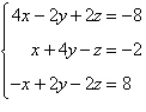
A)
B)
C)
D) inconsistent
E)

A)

B)

C)

D) inconsistent
E)


Unlock Deck
Unlock for access to all 53 flashcards in this deck.
Unlock Deck
k this deck
40
Find the equation of the parabola  that passes through the points.
that passes through the points. 
A)
B)
C)
D)
E)
 that passes through the points.
that passes through the points. 
A)

B)

C)

D)

E)


Unlock Deck
Unlock for access to all 53 flashcards in this deck.
Unlock Deck
k this deck
41
Sketch the graph of the inequality. 
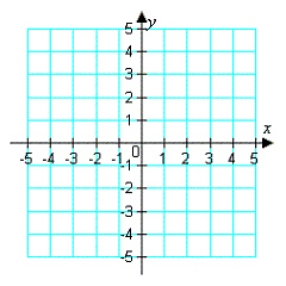
A)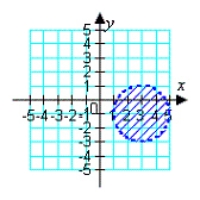
B)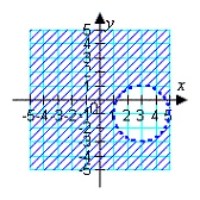
C)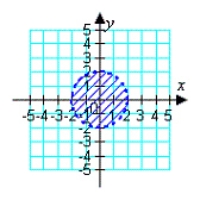
D)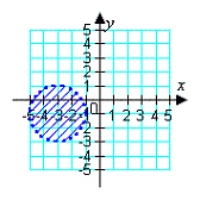
E)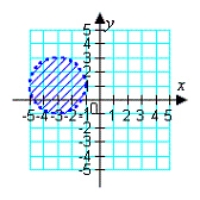


A)

B)

C)

D)

E)


Unlock Deck
Unlock for access to all 53 flashcards in this deck.
Unlock Deck
k this deck
42
Use a graphing utility to graph the inequality. Shade the region representing the solution. 
A)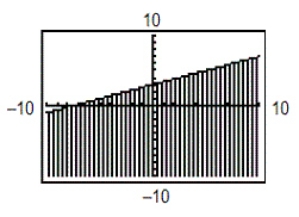
B)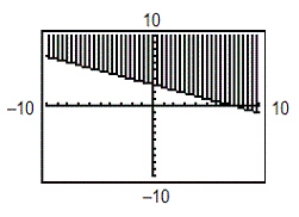
C)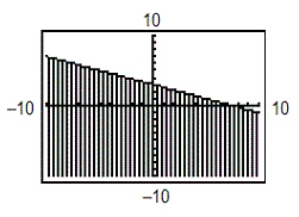
D)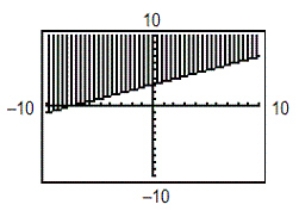
E)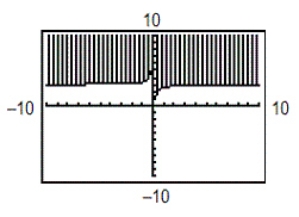

A)

B)

C)

D)

E)


Unlock Deck
Unlock for access to all 53 flashcards in this deck.
Unlock Deck
k this deck
43
Write an inequality for the shaded region shown in the figure. 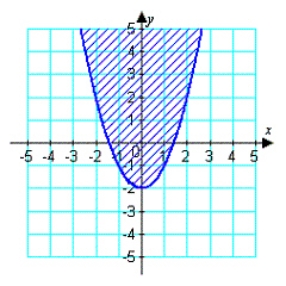
A)
B)
C)
D)
E)

A)

B)

C)

D)

E)


Unlock Deck
Unlock for access to all 53 flashcards in this deck.
Unlock Deck
k this deck
44
Use a graphing utility to graph the inequalities. Shade the region representing the solution set of the system. 
A)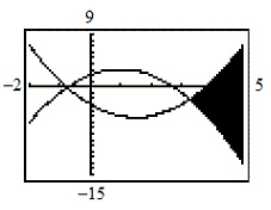
B)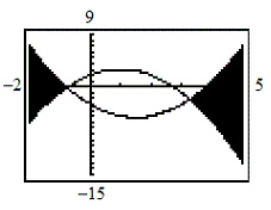
C)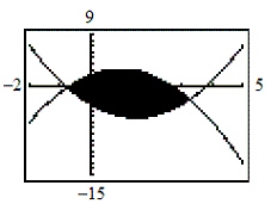
D)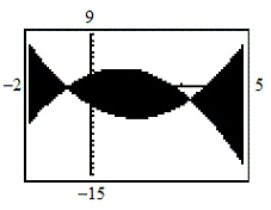
E)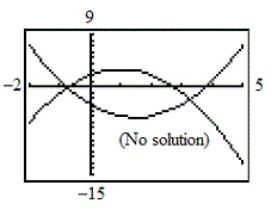

A)

B)

C)

D)

E)


Unlock Deck
Unlock for access to all 53 flashcards in this deck.
Unlock Deck
k this deck
45
Determine which one of the ordered pairs below is a solution of the system of linear inequalities. 
A) (0, 1)
B) (5, -3)
C) (-8, -5)
D) (3, -3)
E) (5, 3)

A) (0, 1)
B) (5, -3)
C) (-8, -5)
D) (3, -3)
E) (5, 3)

Unlock Deck
Unlock for access to all 53 flashcards in this deck.
Unlock Deck
k this deck
46
Find the minimum and maximum values of the objective function and where they occur, subject to the indicated constraints. 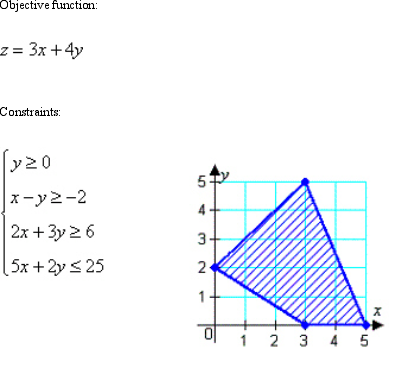
A)
B)
C)
D)
E)

A)

B)

C)

D)

E)


Unlock Deck
Unlock for access to all 53 flashcards in this deck.
Unlock Deck
k this deck
47
Find the minimum and maximum values of the objective function and where they occur, subject to the indicated constraints. (You should graph the feasible solutions on the grid below before you attempt to find the minimum and maximum values.) 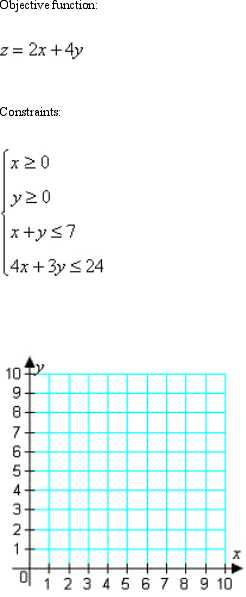
A)
B)
C)
D)
E)

A)

B)

C)

D)

E)


Unlock Deck
Unlock for access to all 53 flashcards in this deck.
Unlock Deck
k this deck
48
Derive a set of inequalities to describe the region. Triangle: vertices at (0, 0), (3, 0), (3, 4)
A)
B)
C)
D)
E)
A)

B)

C)

D)

E)


Unlock Deck
Unlock for access to all 53 flashcards in this deck.
Unlock Deck
k this deck
49
For the given supply and demand equations, find the consumer surplus. 
A) $10,742,188
B) $5,859,375
C) $11,718,750
D) $9,765,625
E) $14,648,438

A) $10,742,188
B) $5,859,375
C) $11,718,750
D) $9,765,625
E) $14,648,438

Unlock Deck
Unlock for access to all 53 flashcards in this deck.
Unlock Deck
k this deck
50
Sketch the graph and label the vertices of the solution set of the system of inequalities. Shade the solution set. 
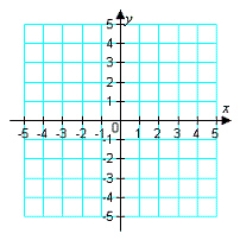
A)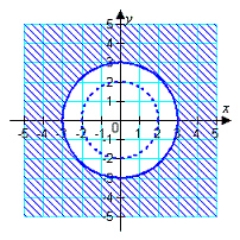
B)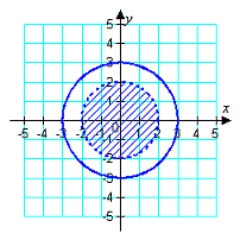
C)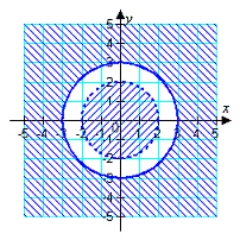
D)

E)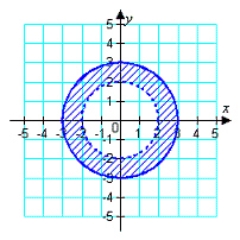


A)

B)

C)

D)


E)


Unlock Deck
Unlock for access to all 53 flashcards in this deck.
Unlock Deck
k this deck
51
Determine which one of the ordered pairs below is a solution of the system of linear inequalities. 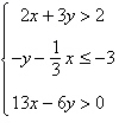
A) (0, 0)
B) (-1, 4)
C) (3, -3)
D) (-9, 7)
E) (9, 6)

A) (0, 0)
B) (-1, 4)
C) (3, -3)
D) (-9, 7)
E) (9, 6)

Unlock Deck
Unlock for access to all 53 flashcards in this deck.
Unlock Deck
k this deck
52
An investor has $150,000 to invest in two types of investments. Type A pays 5% annually and type B pays 6% annually. To have a well-balanced portfolio, the investor imposes the following conditions. At least one-third of the total portfolio is to be allocated to type A investments and at least one-third of the portfolio is to be allocated to type B investments. What is the optimal amount that should be invested in each investment? 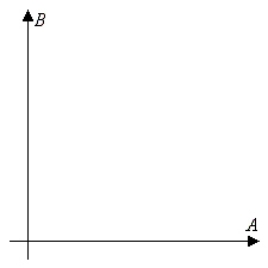
A) $60,000 in type A (5%), $90,000 in type B (6%)
B) $0 in type A (5%), $150,000 in type B (6%)
C) $150,000 in type A (5%), $0 in type B (6%)
D) $100,000 in type A (5%), $50,000 in type B (6%)
E) $50,000 in type A (5%), $100,000 in type B (6%)

A) $60,000 in type A (5%), $90,000 in type B (6%)
B) $0 in type A (5%), $150,000 in type B (6%)
C) $150,000 in type A (5%), $0 in type B (6%)
D) $100,000 in type A (5%), $50,000 in type B (6%)
E) $50,000 in type A (5%), $100,000 in type B (6%)

Unlock Deck
Unlock for access to all 53 flashcards in this deck.
Unlock Deck
k this deck
53
Derive a set of inequalities to describe the region. 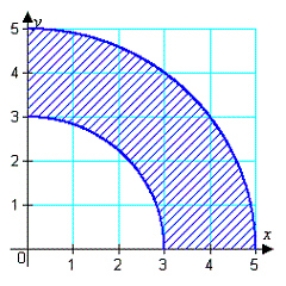
A)
B)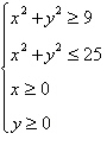
C)
D)
E)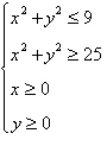

A)

B)

C)

D)

E)


Unlock Deck
Unlock for access to all 53 flashcards in this deck.
Unlock Deck
k this deck


